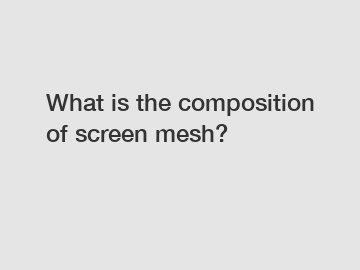What is the composition of screen mesh?
What is the composition of screen mesh? This question can be answered by examining the materials used in its construction, the manufacturing process involved, and the significance of these factors.
Screen mesh is typically made up of metallic wires that are woven together to form a mesh structure. The most common types of materials used for screen mesh include stainless steel, aluminum, and copper. Each material offers different properties and benefits, making them suitable for specific applications.
Stainless steel, for example, is known for its corrosion resistance and durability, making it an ideal choice for industries such as mining and construction where harsh conditions are often encountered. Aluminum, on the other hand, is lightweight and easy to handle, making it suitable for applications that require portability or ease of installation. Copper is often used in electrically conductive applications due to its excellent conductivity.

The manufacturing process of screen mesh involves several steps. Firstly, the selected metallic wires are drawn or extruded into the desired diameter and shape. They are then woven together using various techniques such as plain weave, twill weave, or Dutch weave. The choice of weave pattern affects the strength, openness, and filtration capabilities of the screen mesh.
The composition of screen mesh plays a crucial role in its functionality and performance. The choice of material determines its resistance to corrosion, temperature, and mechanical stress. For instance, when used in filtration applications, a corrosion-resistant material like stainless steel ensures that the screen mesh remains effective and functional over an extended period.
Moreover, the composition of screen mesh impacts its ability to filter, separate, or protect. The size and shape of the openings in the mesh structure control the particle size that can pass through or be retained. This makes screen mesh widely used in various industries, such as agriculture, pharmaceuticals, and wastewater treatment, where precise separation and filtration are essential.
The impact of screen mesh composition is evident in its wide range of applications and benefits. In the mining industry, screen mesh made of stainless steel or high-strength steel is employed to withstand abrasive materials and enhance the efficiency of ore extraction. In the food processing industry, screen mesh made of FDA-approved materials ensures hygiene and prevents contamination. Additionally, screen mesh is utilized in window and door screens to keep insects out while allowing air circulation.
In conclusion, the composition of screen mesh primarily consists of metallic wires, such as stainless steel, aluminum, or copper. The choice of material, manufacturing process, and weave pattern influences its functionality, durability, and filtration capabilities. Understanding the composition of screen mesh is crucial for selecting the right type of mesh for various applications, ensuring efficient performance, and meeting specific industry requirements.
Are you interested in learning more about installing window screens, copper metal mesh, china epoxy coated mesh? Contact us today to secure an expert consultation!
200
0
0

Comments
All Comments (0)